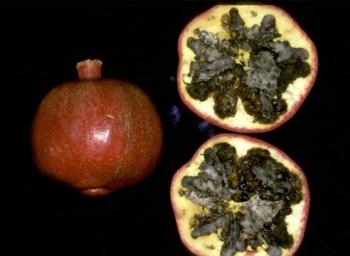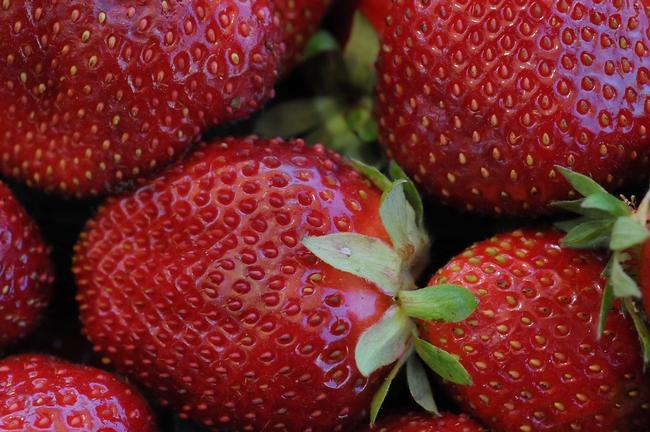
Posts Tagged: Richard Molinar
Demand increases for Asian vegetables

Richard Molinar, UC Cooperative Extension advisor in Fresno County, told the reporter that demand is driving increased cultivation of Asian vegetables in Fresno County.
"We have around 50 to 75 Chinese farmers here in Fresno County and over 2,000 acres of Chinese crops selling locally as well as nationwide," Molinar said.
The article noted that UC Cooperative Extension offers advice and services to these growers.
"In addition to providing them with technical support, we also help those farmers to find new marketing opportunities," Molinar said.
UCCE makes Southeast Asian vegetables easy to eat

At certain roadside stands, at farmers markets that cater to diverse clientele and in small Asian supermarkets, adventurous Californians can buy vegetables like bitter melon, Chinese long beans, opo and luffa. Finding them is the first step, knowing how to prepare them is another matter. UC Cooperative Extension has made these less familiar vegetables more accessible by creating a collection of easy-to-cook and nutritious Southeast Asian vegetable recipes.
The recipes were developed by UCCE nutrition educators in Fresno and the statewide UC Expanded Food and Nutrition Education Program team with Richard Molinar, a UCCE advisor in Fresno County. Connie Schneider, director of the UC Youth, Families and Communities Program, and Molinar started by researching the traditional usage of Asian vegetables. They modified some ingredients and procedures in the recipes to simplify preparation and improve the nutritional profile.
“We minimized the number of ingredients in each recipe, added clear measurements and tested the dishes,” Schneider said. “They are delicious.”
For the last 18 years, Molinar has worked with small-scale farmers in Fresno County, which boasts the largest concentration of Hmong farmers in the U.S. Fresno County is also home to farmers of other ethnicities from Laos, China and Vietnam. Molinar and his assistant, Michael Yang, have introduced Southeast Asian immigrant farmers to the latest farming technologies, helped them develop plans to ensure the safety of the food they grow, and worked with them to find new marketing opportunities. Many of these farmers have begun growing vegetables common in California, and most have also kept some space on the farm for the vegetables of their homelands.
The UCCE educators recognized that the rich culinary traditions of local Southeast Asian immigrants could be adapted and used by people of all cultures to increase their consumption of vegetables. Besides, encouraging consumption of Southeast Asian vegetables adds new marketing opportunities for the farmers.
“This has been a unique opportunity to bring UCCE’s farm advisors and nutrition educators together to assist farmers and the public,” Molinar said. “These recipes will encourage more people to buy these nutritious vegetables, expanding the market for the growers.”
The 12 recipes are printed on cards, each with photos of the fresh vegetable and background information. For example, the recipe card for “bitter melon stir fry” notes that the crinkly skinned vegetable is native to India and is eaten when young and green, as bitterness increases with age. The recipe is accompanied by a photo of the prepared dish and complete nutrition facts per serving.

"I grew up with zucchini," Molinar said, "but I prefer the flavor and texture of angled luffa."
The printed cards will be distributed at farmers markets where Southeast Asian vegetables are sold, and they are available on the Fresno County UC Cooperative Extension website. Farmers who sell Asian vegetables at farmers markets may pick up 10 packets of recipes for free at the UC Cooperative Extension in Fresno, 1720 S. Maple Ave., Fresno. Direct links to each of the recipes are below:
- Bitter Melon Stir Fry
- Chinese Long Bean and Tofu Salad
- Chinese Winter Melon Chicken Soup
- Field of Greens Salad
- Fuzzy Gourd Stuffed with Pork and Mushrooms
- Lemongrass Chicken Soup
- Luffa and Prawns
- Marinated Japanese Eggplant
- Opo and Beef
- Snow Pea Daikon Salad
- Strawberry Spring Rolls
- Spicy Shrimp and Bok Choy Noodle Bowl
Following are two sample recipes:
Bitter Melon Sir Fry
Serves 4
Ingredients:
1 ripe bitter melon, seeded and sliced
1 tablespoon olive oil
1 onion, diced
3 garlic cloves, crushed
½ lb. ground pork
½ lb. medium shrimp, peeled and deveined
1 tomato, chopped
1 tablespoon reduced sodium soy sauce
Pepper to taste
Directions:
- Place sliced bitter melon in boiling water until just tender (2-3 minutes). Drain
- Heat olive oil in skillet over medium heat. Sauté onions for about 5 minutes until tender.
- Add garlic; sauté an additional 2 minutes; mix in pork and cook until no longer pink.
- Add shrimp; cook about 5 minutes until done.
- Add tomato, bitter melon, and soy sauce; cook until tender.
Luffa and Prawns
Serves 4
Ingredients:
1 tablespoon vegetable oil
1 garlic clove, minced
1 lb large prawns, peeled and deveined
2 luffa (angled luffa or smooth luffa), chopped
¼ cup bamboo shoots
1 teaspoon coriander
1 tablespoon reduced sodium soy sauce
1 green onion, sliced
Directions:
- Heat oil in a wok/pan; add garlic and stir fry for 1 minute.
- Add prawns; cook until done
- Add luffa; continue to stir fry with prawns until just tender, about 5 minutes.
- Add bamboo shoots, coriander, and soy sauce to pan and stir fry a few minutes
- Sprinkle with green onion and serve.
UC scientists studying 'baffling' pomegranate ailment
A mysterious sudden crippling or death of pomegranate trees may be due to cold temperatures, said a story in Western Farm Press.
Three farmers and Themis Michiliades, UC Davis plant pathologist based at the UC Kearney Agricultural Research and Extension Center, agreed that low temperatures have a lot to do with the problem. Michailides cited an Iranian research paper that showed similar cold snap damage. Michailides and Richard Molinar, UC Cooperative Extension farm advisor in Fresno County, said damage from dieback this year was more common in sandier soils, perhaps because heavier soils hold moisture.

Claude Phené, a retired USDA-ARS researcher, discussed a two-year-old pomegranate irrigation and fertigation trial at Kearney.
Western Farm Press runs 1,000-word story on Kearney blueberry event
The annual Blueberry Open House at the UC Kearney Agricultural Research and Extension Center last month warranted lengthy coverage by Western Farm Press.
Freelance writer Dennis Pollock reported that Manuel Jimenez, UC Cooperative Extension advisor in Tulare County, a small-scale farming expert, walked among the mature blueberry plants at Kearney, describing their good points and bad points.
"The perfect blueberry would be one that is big, firm, sweet, easy to harvest and grows in high pH (soil conditions)," he said.
At the event, Richard Molinar, UCCE advisor in Fresno County, small-scale farming, conducted a blueberry tasting, allowing those who attended to vote for their favorite three varieties. He said that variety isn't the only factor impacting flavor.
"Flavor is also affected by weather, soil factors, plant nutrition and irrigation frequency," Molinar said.
Jimenez introduced growers to two new research projects in blueberries:
- Jimenez and Larry Schwankl, Kearney-based UCCE irrigation specialist in the UC Davis Department of Land, Air and Water Resources, have teamed to study the effects of varying irrigation levels on blueberries.
- Jimenez has grafted popular blueberry varieties onto the roots of farkleberry (Viccinium abroreum), which has greater tolerance of alkaline soils like those found in the San Joaquin Valley. By reducing or eliminating soil and water acidification, using the alternate rootstock may provide a significant cut in production costs.

Manuel Jimenez leads a tour of the 15-year-old blueberry research plot.
Chandler strawberries get attention

According to the article, Chandler was introduced in 1983 and was dominant in Southern California production in the late '80s and early '90s, before being surpassed by other varieties. Chandler was bred by Victor Voth and Royce Bringhurst of the University of California.
This year, a well-known strawberry grower among Southern California farmers markets has resumed growing the Chandler variety. Harry's Berries otherwise grows Gaviota and Seascape varieties, both also developed by the UC strawberry breeding program, but will be bringing Chandler berries to markets this year.
4-H Million Trees Project shelters Pacifica Gardens with natives and fruit trees
The Pacifica Tribune
4-H volunteers continue to plant trees for the 4-H Million Trees program, which was started in Pacifica by 4-H member Laura Webber. Reporter Jane Northrop covered 4-H volunteers planting hedge trees at Pacifica Gardens recently.
So far, the paper reports, the program has seen at least 41,000 children plant 350,000 trees.
The program has spurred many 4-H members to propose tree-planting projects at nearby schools, parks and neighborhoods. One of the teens who wrote a grant proposal for another tree-planting event explained why she took on the project.
"I basically wanted to write the grant because I thought it would be a great experience for me and I wanted to help in more ways than just showing up to the plantings. I also wanted to really push myself to do something that I had never done before," said Julia Hurley, a Pacifica 4-H member and eighth-grader.
Fresno farm meeting attracts Asian growers
Fresno Bee
Reporter Robert Rodriguez covered a meeting of Southeast Asian farmers in Fresno, where one of the primary topics was government regulations.
Richard Molinar, UC Cooperative Extension advisor in Fresno, has helped Southeast Asian farmers comply with regulations. At the meeting, he urged farmers to spread the word about how to follow government regulations and who can help.
"Part of this is your responsibility to find out what you need to do," he said. "This not an insurmountable problem."
The meeting was presented by the National Hmong American Farmers, and USDA's Joe Leonard, Jr., was the keynote speaker.
